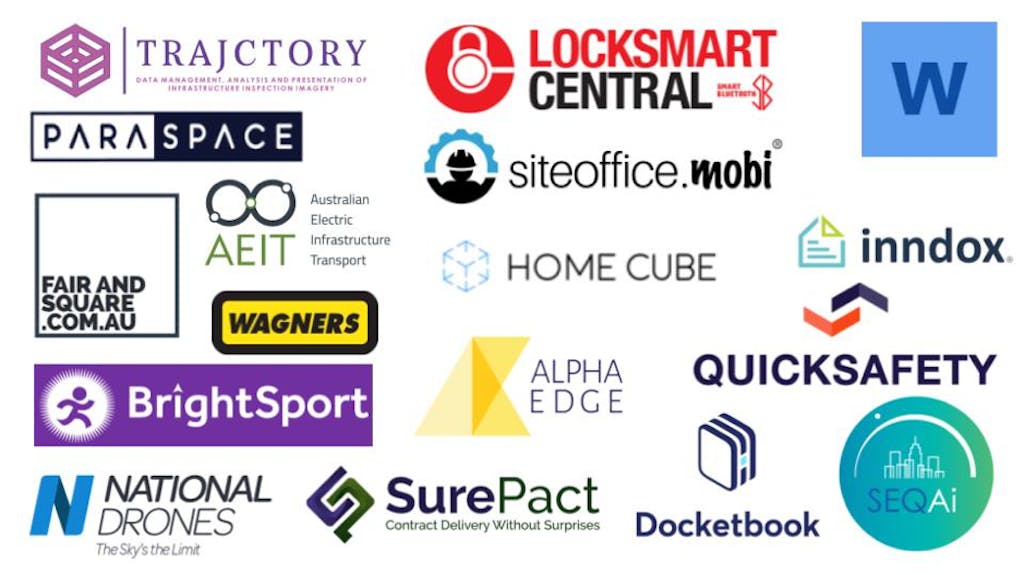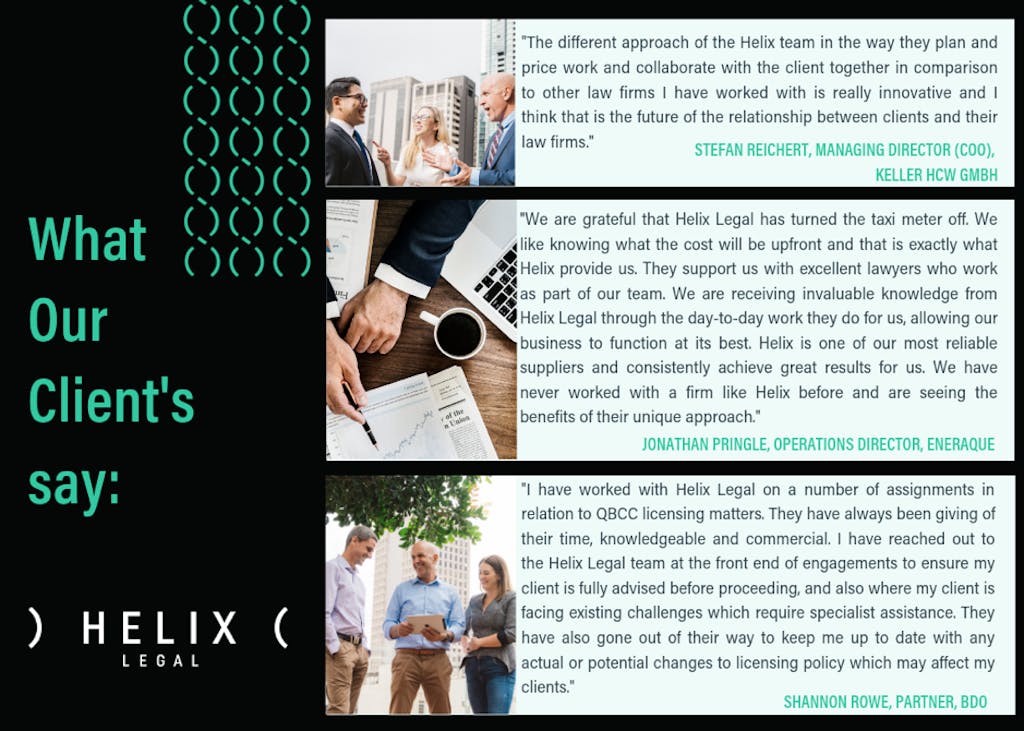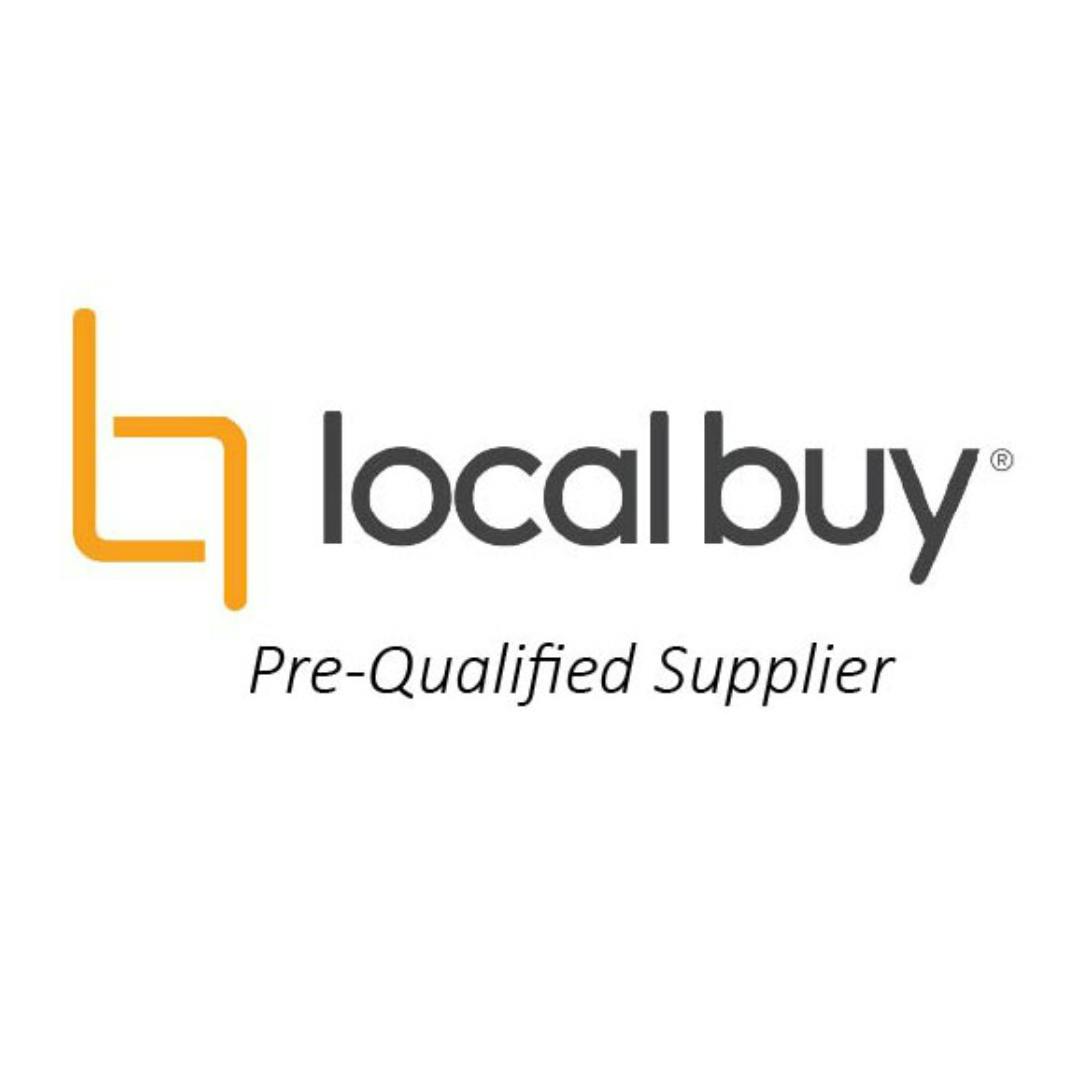I was recently interviewed by Michael Bromley of Beyond Billables for an upcoming podcast. Michael is a consummate professional and he made this a very enjoyable and relaxing chat.
The focus of the interview was twofold. Firstly it dealt with my integration into Helix Legal as a non-lawyer and in particular, what knowledge and experience I offer clients. Secondly, the interview delved into how from my perspective, Helix Legal differs from other law firms.
All of us at Helix Legal pride ourselves on being a new breed of professionals, absolutely committed to changing the way legal services are delivered to the construction and infrastructure industry.
What is ‘NewLaw’?
The founder of Helix Legal, Janelle Kerrisk has a very clear vision of what she believes entails “NewLaw”:
“NewLaw” is redefining what it means to be a law firm by writing a new operational rule book. For Helix there are 5 New Breed Rules:
Rule 1: Do not live and die by the billable hour
Rule 2: Use technology to drive excellent client solutions
Rule 3: Build business assets that benefit our client
Rule 4: Use the best talent for the client’s Project
Rule 5: Forget the corner office and embrace real collaboration
Our mission at Helix is to build a scalable legal business that delivers solutions for the construction and infrastructure industry.”
As a non-lawyer, what do I bring to Helix Legal?
1. I have been a long time consumer of legal services. I know what clients want.
I spent 22 years working for the industry regulator in Queensland where I did my absolute best to build reform and implement policy that I believed in. During this time I gained a great appreciation of the fact that construction law plays a large role in building a better industry and must be understood by all industry participants. I also was regularly required to obtain legal assistance from external lawyers in the performance of my functions.
My experience as a consumer of legal services has given me a very clear idea of:
- the kind of business I do not want to be part of; and
- the multidisciplinary business of the future I am now having a hand in creating.
In an article entitled My top 10 client construction law fails I stated:
“The fact that I am not a lawyer and have for decades been a consumer of legal services means I instinctively see things from the perspective of clients.”
2. I have empathy for the plight of the different parties in the industry
Subcontractors, builders and developers all face unique challenges. Builders and subcontractors deserve to be paid for work done or services supplied. Security of Payment (SOP) continues to be a significant issue confronting these industry parties. I have written a number of SOP articles, including one entitled Everybody in the construction industry deserves to be paid where I stated:
“If a person or company carries out construction work or supplies goods or services under a contract for the benefit of another person or company, and they fulfill all their contractual and legal obligations, they deserve to be paid in full and on time, every time.
This is a fundamental entitlement and right that every reasonable and ethical person working in the construction industry would support.
I do not draw a distinction between the different types of persons or companies working in the industry. I am of the view that a builder working for an owner or developer has exactly the same rights in this regard as a subcontractor working for a builder or a sub-subcontractor working for a subcontractor.”
Some of my other more recent SOP articles are:
- The desperate plight by subcontractors to be paid continues today
- SOP challenges for Developers
- Many parties do not appreciate the magnitude of SOP reforms
I am of the view that to assist different parties in the construction industry lawyers, advisors or consultants like me must have empathy for their struggles and challenges. The days of seeing clients purely in the context of an ATM dishing out money is thankfully, largely over. However, I am aware that many parties still feel a disconnect with a lot of professionals whose job is to assist them.
3. I understand the contractor licensing requirements of the QBCC
I was the inaugural Compliance Manager of the Building Services Authority, the predecessor of the QBCC. In an article entitled An effective licensing regime is not a silver bullet for the problems of the industry …..but we must have one I demonstrated the extent of my knowledge in this regard.
I have a comprehensive understanding of the Minimum Financial Requirements for licensing. In an article entitled Laing O’Rourke licence suspension. Lessons Learnt I highlighted recent developments in this regard.
4. I have extensive knowledge of progress payments and adjudication regimes
As a result of being the inaugural Adjudication Registrar, a position I held for 13 years (2004-2017), I have considerable knowledge about the progress payment and adjudication regimes. I also keep a keen eye on developments relating to these issues and have written a number of articles along these lines.
In an article entitled Is Adjudication Shopping about to make a comeback in Qld?, I alert readers to the possibility of Authorised Nominating Authorities replacing the Adjudication Registry in terms of receiving adjudication applications and appointing adjudicators. I am of the view that if this was to occur, it would be an extremely detrimental outcome for the industry in Queensland.
In an article entitled SOP is a State of Origin battle I point out “the New South Wales and Queensland Governments are locked in a State of Origin battle of vastly different strategies in relation to giving effect to the key SOP initiatives, namely:
- progress payments; and
- adjudication.”
5. I inform parties of emerging industry issues
I am committed to bringing to the attention of parties emerging industry issues. I devote a lot of time undertaking research with a view to writing informative articles. To date, I have written 61 articles. I am committed to providing readers with easily understood information. All my articles contain links to material to further assist readers.
By way of example, I have written a number of articles on how innovation-driven changes are going to disrupt the construction industry over the next 20 years. In my most recent article along these lines entitled Innovation advances and ‘impact investments’ converge to disrupt the Construction Industry I state:
“In my view current industry participants must embrace innovation advancements and adopt new construction methods and techniques with a view to delivering new, sustainable, efficient, affordable and uniquely purpose built outcomes for domestic and commercial owners if they wish to survive and indeed flourish.”
6. I offer up opinions as a means to get people aware of issues and engaged
It has been my experience that the overwhelming majority of parties do not express their views on proposed industry reforms when presented with opportunities to do so. In an article entitled Many parties do not appreciate the magnitude of SOP reforms I stated:
“1100 parties took the time and effort to attend consultation sessions on these reforms. Given the size, significance and number of different parties that comprise the industry, I find this response to be underwhelming.”
In this article, I went on to justify my reasons for making such a statement.
In another article entitled SOP reforms… Something STILL does not add up I alerted readers to the fact that in my view the full regulatory costs of these reforms were still unknown at the time I published this article on 5 February 2019.
I am of the view that parties must overcome their reluctance to become engaged in reforms and take responsibility for shaping how the industry will be regulated in the future.
Governments always provide parties with the opportunity to provide input and feedback to proposed industry reforms. Parties must step up in this regard. I see my role in this regard as to distilling information into easy to understand information so parties can appreciate the issues and proposed reforms.
What do the Helix lawyers bring to the table?
As a result of me not being involved in discussing client’s concerns and listening and observing clients, I have plenty of opportunities to look at how our lawyers perform and function for the benefits of clients.
1. Work together really well
The most impressive thing I have noticed is how the experienced lawyers are always available to provide assistance to the newbies. They are all very giving in their time and knowledge to less experienced colleagues and I am continually struck as to how rewarding and satisfying such an open and informative dialogue must be for all concerned.
I also value the respect the entire team offers each other. They are a really diverse bunch. There are teenagers, Kiwis (rugby season is so long for us Aussie’s!!), far North Queenslanders, early career lawyers and those who have worked in law firms for more than two decades, I have never in all of my career worked with such a connected team with such a strong sense of purpose.
Clients benefit enormously from the collaboration that occurs as a result of the team having such shared purpose. All issues are fully canvassed and the subject of much discussion across the business.
2. No ‘overselling’ of clients prospects
Way too many times in the past I have seen the consequences of overselling as a consumer of legal services. I know first hand – no one likes to have to answer to the boss or the board about how things went so wrong and why it cost 4 times as much as what was approved.
We provide a Project Plan upfront which means that we think the solution that is right for clients through from the very beginning.
If we think you are barking up the wrong tree, we tell you straight up.
We might make less money on the issue you have come to us with but we hope that by being straight up with you that you will keep talking to us. The way we see it, if you do well, we do well.
3. Only provide advice to clients after gaining an understanding of the issues
One thing I pride myself on is my ability to listen. The business has embraced this as a real asset by encouraging me to write, generate discussion and go out and talk to clients about the industry. For a business like Helix, actually listening to clients allows us to grow at a rate of knots.
The benefit to the lawyers not turning the clock on immediately is that clients are more open to telling us what the big picture is and what their business is all about. How they do business, what drives them, what is at risk for them and what their best outcome is in their mind. Client’s have often spent a lot of time and money already trying to resolve an issue before they come to us and so it is important to listen to be able to get to the right strategy.
We deliver differently by listening, appointing the right team, working out a clear plan and being upfront about costs.
4. An authentic willingness to share knowledge
I like that the lawyers I work with are willing to share what they know with our clients so that where possible, they never come back to us with exactly the same issue. I know for a fact that lawyers truly have the ability to add value to those who work in the construction industry.
While other law firms treat training as a marketing tool, at Helix it is a genuine and core service offering. We are the only law firm appointed to the all of Queensland Government Procurement and Contract Management Learning and Development Panel. We worked hard for this appointment because we all believe that the start of better solutions and better outcomes is good training. Head of Procurement and Contracts Gerard Meade holds accreditation as a Probity Services Provider (Procurement) through the Resolution Institute and has over a decade of experience in Construction and Infrastructure Procurement. Gerard, and in fact all of the lawyers are committed to using what they know to provide practical training. I am proud as punch when we deliver training that does not use all the “lawyer guff” and does not try to turn our clients into lawyers but that is real and practical and relevant.
For the last 2 years, we have run an Innovation Series for the Construction Industry that I have not seen any of our competitors attempt. Our objective has been to help our clients and referrers to see over the horizon for what is the future of our industry. Not to sell them a contract review but to help them to plan for the future. There is nothing more rewarding for me and the Helix team than being able to introduce and make connections at these events to close the gap between those innovating and those afraid of change.
To date, we have featured the following innovators:
 5. They know the law
5. They know the law
This might sound funny but in my time on the other side of the fence consuming legal services, I saw many people disadvantaged by going to a lawyer who dabbles in construction law. The Helix lawyers don’t dabble, they stick completely in their lane.
I often open conversations with new connections I meet through Helix with “I am not a lawyer”. This is because my colleague Janelle has ‘strongly impressed on me’, to make sure I always make people alert to this and also because it gets an early laugh from people who find it amusing how quick I am to point this out. Therefore, from a very selfish position, I am grateful that the lawyers know the law – because they have the answers I do not!
6. They are not afraid to be humans
When you have been in the industry as long as me you appreciate that life is just to short to deal with people who are not genuine and authentic. Helix lawyers are down to earth people first and foremost. This resonates with clients and they keep coming back to us. There can be no greater confirmation that we have something very special.
How do we bring all our capabilities together for the benefit of clients?
We are a down-to-earth team of lawyers, strategists and big-picture thinkers who harness our individual capabilities to benefit our clients. Success is delivered by the collective power of collaboration. We understand that sometimes the solution is not the black letter law answer.

Not intended as legal advice. Read full disclaimer.



